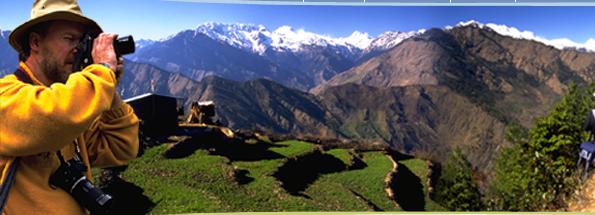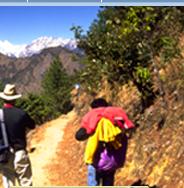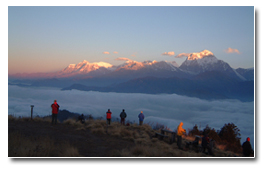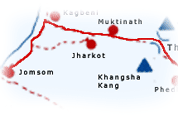| It is easy to see why
the hidden mountain stronghold of the Annapurna Sanctuary
is one of the most popular trekking destinations in
Nepal. Surrounded by a ring of impressive mountains,
including Annapurna 1 (8091m./26538ft), this high and
glaciated wilderness is, quite simply, awe-inspiring.
From the terraced farmland above Pokhara, we trek on
good trails through scattered settlements and abundant
forest, climbing gradually into a world of ice and snow.
The combination of pretty villages and farmland, set
against the panorama of high peaks beyond, makes this
one of the most picturesque of treks. After exploring
the inner sanctuary, we walk out via an alternative
route, following high ridges to Ghorepani. Here, a pre-dawn
start for the walk up to Poon Hill is rewarded by inspirational
views of Dhaulagiri and the Annapurnas. Presenting a
magical mix of excellent trekking, friendly villagers
and outstanding mountain views, this is Nepal at its
best.
| Fact Box |
|
| Starting
from: |
Kathmandu |
| Ending
at: |
Pokhara |
| Grade: |
Moderate-Difficult
|
| Highest
access of the trek: |
4200m (Annapurna
Base Camp) |
| Culture
encounter |
Gurung, Magar, Thakali |
| Trekking
type |
Teahouse |
| Himalayan
sights: |
Dhaulagiri, Fishtail,
Annapurna range, Manaslu, Nilgiri |
| Most
Attraction of the trek: |
Close Mountain View,
Villages |
| Best Seasion: |
February, March, April, May,
October, November |
| Meal: |
breakfast, lunch, & Dinner) |
| Activities:
|
Trekking |
| Transportation:
|
Car / Van |
| Accommodation: |
Teahouse |
| Minimum
Group Size: |
1 |
| Per
day Walking: |
5 to 7 hours |
| Itinerary type |
Fixed / Customized |
| Day
to Day Itinerary |
| Day
01 |
Arrive
in Kathmandu Airport & Transfer to Hotel
Welcome dinner in the evening. |
| Day
02 |
Full
day Sightseeing in Kathmandu Valley.
We will be visiting three of the famous heritage
sites in Kathmandu. You will visit first the Swayambunath
Stupa (Monkey Temple). It is said that
Swayambunath Stupa is more than 2,000 years old,
and it symbolizes knowledge. The painted eyes on
all four sides symbolize the all-seeing power of
Buddha. It is an important Buddhist place where
pilgrims from all over the world come.
It
is a 30 minutes drive to Boudhanath
Stupa, another important Buddhist pilgrims
site. This ancient Stupa is considered one of the
biggest in the World. Every morning and evening,
many Buddhist devotees come here to pray and circumambulate
enabling the visitors to observe local religious
practices.
One
of the holiest hindu shrines in the world,
The fabulous pagoda houses the linga of
Lord Shiva and people bathe in the Bagmati River
with a faith of cleansing themselves spiritually.
Many Sadhus or Hindu Ascetics live here. During
religious festivals, Hindus come to make offerings,
and it is sometimes very crowded.
Bhaktapur
Durbar Square: This former royal palace
complex offers the elegant 15th century Palace of
55 win-dows, artistic courtyards, the Golden gat.
Patan
Durbar Square : Durbar Square an enchanting
melage of palace buildings, courtyards and pagoda
temples, is the center of Patan's religious and
social life. |
| Day
03 |
Kathmandu
to Besisahar By bus 823m
The journey begins by bus from Kathmandu
to Dumre. The bus ride takes approximately about
5 hours to reach Dumre.It takes about 3-4 hours
to reach Besisahar, where you first night camp awaits
you. This is a small town at the head of the Round
Annapurna Circuit; here you can find many shops
and a pharmacy where you can buy little things that
you might have forgotten.
Accommodation at lodge |
| Day
04 |
Besisahar
to Nadi (1011m)
Your first day of trekking starts with
a gentle downhill and straight walk. The trail climbs
up the east bank of the river, past a high majestic
waterfall surrounded by the screw pine trees. From
here, the trail then passes small-scattered villages
and terraced fields to a small village of Ngadi.
The trail crosses the Ngadi Khola on a long suspension
bridge, and continues climbing gradually. It makes
a steep climb through the scrub forests to Bahundanda
(Hill of the Bahuns), an attractive village situated
in a saddle on a long ridge. Bahun caste is the
highest of the four caste of the Hindu caste system.
These people are priests, and are normally experts
in the field of religion and education during the
olden times. They used to follow a strict vegetarian
diet. |
| Day
05 |
Nadi
to Jagat (1314m)
The hill passing through rice fields, in
and out of the deep river gorges, and then crosses
the Marshyangdi on a long suspension bridge and
village of Syange. From Syange, the trail stays
near the river, the forest of rhododendron and pine
trees. It passes the Tibetan village of Jagat where
you can find several suspension bridges and passing
several beautiful waterfalls land view the tower
of Mt. Lamjung (22,291Ft.), Manaslu (26,760 Ft.)
and Peak 29 (24,652 Ft.). Overnight at Jagat. |
| Day
06 |
Jagat
to Dharapani(1943m)
Walking distance of about 7 hours from
Jagat to Dharapani, entering Manang district from
Taal and crossing a large bridge to Dharapani .
The route also reaches Lata Manang near the waterfall.
From Lata Manang, the trail continues in an easy
manner staying level, passing through pine forests
past the village of Kodo and reaching another village
of Chame, which is one of the biggest villages in
the Manang valley.
Overnight at Dharapani. |
| Day
07 |
Dharapani
to Chame(2713m)
Dharapani to Chame (2713m) The distance
is covered within 6 hours. The trail now leads to
the west in Manaslu .forming a splendid backdrop
of Annapurna II appearing occasionally to the south.
As we continue, Annapurana range offers a splendid
view. Overnight at Chame. |
| Day
08 |
Chame
to Pisang(3292m)
Keeping by the side of river all day for
about 7 hours and passing through narrow and steep
gorge reach Passing from where Manang Valley (a
wide U - shaped valley) hanging between two giant
snow peaks. Overnight at Pisang. |
| Day
09 |
Pisang
to Manang(3351m) .
After a 7-hour walk through trails and
broad forested valley floor a small stool airstrip
and a village of about 200 houses and Barge monastery
which is the largest in the entire district and
reach Manang. You can see fascinating panoramic
views of the mountain peaks, such as Annapurna,
Pisang peak, and several others. |
| Day
10 |
Manang-
Rest day
It is very important that you take a day
rest and get acclimatized with the altitude. Manang
is a good place to do that because the next three
days will be very challenging and tiring with rapid
gain in altitude. You should never be confident
with the altitude and always be cautious. You can
take an excursion to a little distance away to the
place called Brada. It is a small village that you
will find interesting visiting. |
| Day
11 |
Manang
to Kharka(4200m)
From Manang village, the trail crosses
a stream, climbs to a village of Tenki above Manang,
and then continues to climb out of the Marshyangdi
Valley turning northwest up the valley of Jarsang
Khola. The trail follows this valley northward,
passing a few pastures, a scrub of juniper tress,
as it steadily gains elevation. The trail passes
near the small village of Ghunsa, a cluster of flat
mud roofs just below the trailhead. Now the trail
goes through meadows where horses and yaks graze.
After crossing a small river on a wooden bridge,
the trail passes an ancient old Mani wall in a pleasant
meadow and then reaches another small village of
Yak Kharka. Walking takes about 5 hours. |
| Day
12 |
Yak
Kharka to Throng Phedi high camp (4780m)
The trail continues further along after an hour's
walk reaching to Ledar. From here, the trail continues
to climb along the East bank of Jarsang Khola and
then descends and crosses a stream on a wooden bridge.
From the bridge, continue walking on the steep slope;
watch your steps for loose rocks. The trail is small.
In about 1 hour, you reach Thorang Phedi with only
one lodge. The camp is set high on the slopes. |
| Day
13 |
Thorong
phedi (Thorong La 5514m) to Muktinath 3802m.
You will have to start very early about
3 am because in the late morning there will be lots
of wind blowing which makes walking difficult. More
strenuous downhill walking awaits you on your journey
to Muktinath, a pilgrimage center. The place is
worshipped by Hindus and Buddhist alike; it has
a beautiful landscape set beneath the Damodar Hills.
You can visit the temple and view the ever-burning
flame of the place considered holy by all Hindus
and Buddhist. |
| Day
14 |
Muktinath
to Jomsom(2713m) Tour Ends
Jomsom with beautiful snow mountains and
no tree land ! It is gateway of Mustang trek. Those,
having not good enough time to trek down all the
way to Pokhra can fly to Pokhara-Kathmandu on the
next day. |
| Day
15 |
Early
morning flight to Pokhara - About 20 minutes scenic
flight. Afternoon Relaxing. Overnight at hotel in
Pokhara. |
| Day
16 |
Return
bus to Kathmandunu |
| Day
17 |
Free
day in Kathmandunu |
| Day
18 |
Tour
ends |
Trek Price as per above
program
Group Size |
01 |
2 - 3 |
4 - 5 |
6 - 7 |
8 - 9 |
10 - 11 |
12 + Above |
Price in US$ |
700 |
670 |
650 |
630 |
600 |
580 |
550 |
Package Price Includes
-
Airport / Hotel
/ Airport pick up & drop off by car
-
All the ground
Transportation by bus
- 4 nights accommodation in Kathmandu
-
All the meal
during the trek (Breakfast, Lunch, Dinner)
-
Trek Permit
& National Park Fee
- Annapurna conservation permit,
and all necessary permits.
- Domestic Air Fare US$
67 per person Jomsom to Pokhara
-
An experience
guide (trained by Ministry of tourism), necessary
Trekking staff and their meal/accommodation/transportation/salary/insurance/equipments.
Package Price Excludes
- Personal bar bill, travel
insurance/International airfare
- Items of personal expenses
such as alcoholic drinks, cold drinks, laundry,
tips etc.
- Nepal entry visa fee US$
30 (duration 60 days from date of issue)- Available
at Royal Nepalese Embassies and Royal Nepalese Consulates
abroad or on arrival at Tribhuvan International
Airport in Kathmandu.
- All the entrance fee of temple
in Kathmandu and Pokhara
- All
the meal while you are in Kathmandu

|







